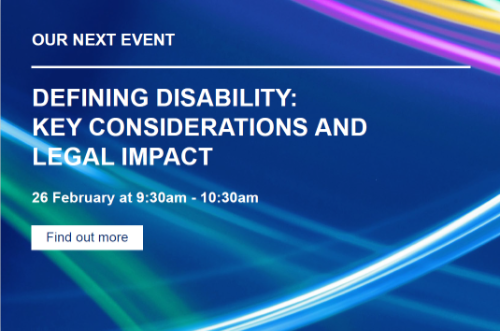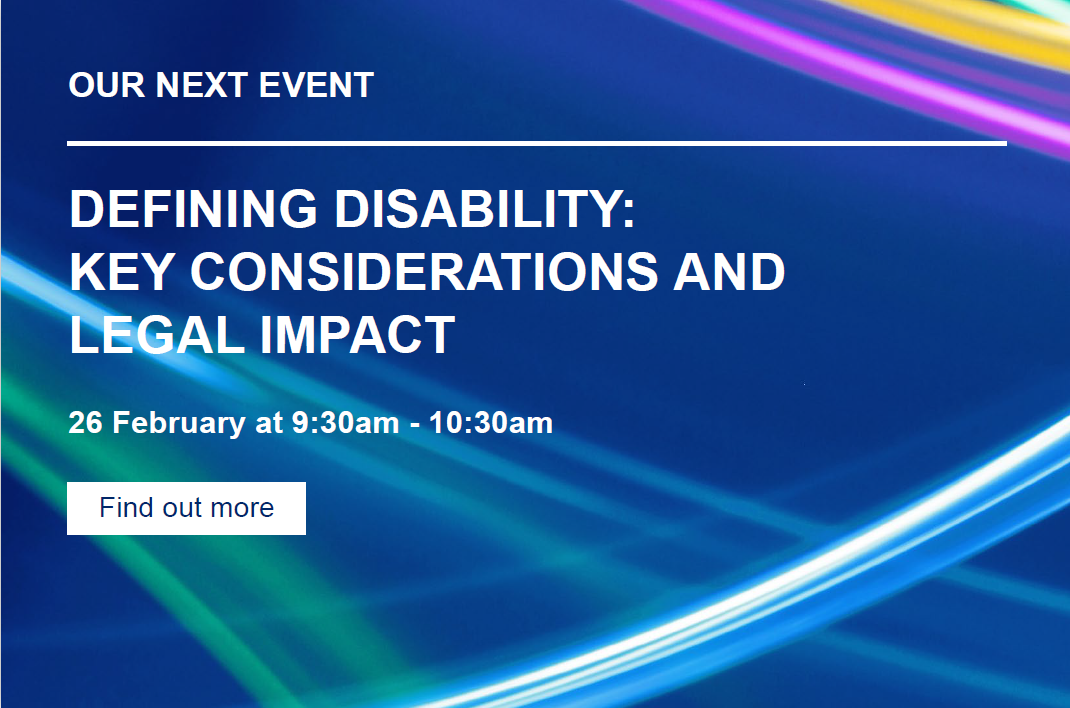Minimal financial assistance for grant recipients
![]() The Subsidy Control Act 2022 (the “Act”) introduced a new concept of minimal financial assistance (“MFA”), whereby public authorities can award low value subsidies without having to comply with the stringent requirements of the Act. As such, the MFA regime represents an attractive route for public authorities to award grant funding without performing the usual procedural steps.
The Subsidy Control Act 2022 (the “Act”) introduced a new concept of minimal financial assistance (“MFA”), whereby public authorities can award low value subsidies without having to comply with the stringent requirements of the Act. As such, the MFA regime represents an attractive route for public authorities to award grant funding without performing the usual procedural steps.
- Details
However, before a public authority can award an MFA subsidy, the proposed recipient must confirm that it will not exceed the MFA threshold. Recipients might receive something similar to the below:
“The amount of MFA offered is £65,000. Before making payment, we require written confirmation that receipt of the payment will not exceed your MFA threshold of £315,000 cumulated over this and the previous two financial years, as specified in section 36(1) of the Subsidy Control Act (2022).”
We consider below how recipients can ensure compliance with the MFA regime.
What’s the threshold?
The MFA regime allows public authorities to award low value subsidies, up to £315,000.
However, £315,000 is a cumulative total. A recipient can receive no more than £315,000 in MFA or comparable types of subsidies over the elapsed part of the current financial year and the two financial years which precede the current financial year.
What are comparable types of subsidies?
As per the Statutory Guidance:
- MFA subsidies;
- Services of Public Economic Interest (SPEI) assistance;
- De minimis EU State aid; and
- Subsidies given as small amounts of financial assistance under the UK-EU Trade and Cooperation Agreement.
Examples
Assuming a subsidy is to be awarded in the current financial year (2023/2024), a recipient cannot have received any comparable subsidies since 1 April 2021 which in cumulation with the subsidy to be awarded have a value of £315,000 or more. By way of example:
| Below threshold (and therefore MFA compliant) | Above threshold (and therefore not MFA compliant) |
|
Small amount of financial assistance awarded on 31 March 2022: £250,000 + Subsidy to be awarded on 31 August 2023: £60,000 Total: £310,000 – MFA regime applies. Business can confirm compliance. |
Small amount of financial assistance awarded on 31 March 2022: £250,000 + Subsidy to be awarded on 31 August 2023: £70,000 Total: £320,000 – MFA regime does not apply to the whole of the subsidy, even though the subsidy to be awarded is only worth £70,000. Business cannot confirm compliance. |
What does this mean?
If the subsidy to be awarded does not cause the grant recipient to exceed its MFA threshold, the recipient can confirm the same to the public authority in writing. The authority may proceed to award the MFA subsidy.
If, however, the subsidy would tip the recipient over the threshold, the recipient should be sure not to unlawfully confirm its compliance with the MFA regime (when it is in fact non-compliant). The prospective recipient should write to the authority to confirm that the MFA regime does not apply to the subsidy.
The public authority will consider how to award the subsidy lawfully. The authority may undertake a compliance assessment for the part of the subsidy which would take the recipient over the threshold. Alternatively, the authority may choose to adhere to all requirements of the Act. That decision is for the public authority, but the fact that a recipient is above the MFA threshold should not, in and of itself, prevent a subsidy being awarded.
If a recipient confirms that it is compliant with the MFA regime when in reality it is not, the consequences may be severe (both on a company and individual basis). False representation is a criminal offence under the Fraud Act 2006. Companies can incur heavy fines and suffer reputational damage. Directors can also be held personally liable (and in serious cases be imprisoned).
Discussion
The new subsidy control regime represents new law for public authorities and grant recipients alike. While the majority of the Act’s requirements apply to public authorities, businesses receiving MFA subsidies must also ensure that they do so lawfully. This may include enterprises receiving business rates relief.
Recipients should adhere to the Sharpe Pritchard rules for compliance with the subsidy control regime for enterprises:
Do confirm in writing that your business is below the MFA threshold. You can only receive an MFA subsidy once you have done so.
However, do not under any circumstances confirm that your business is below the MFA threshold if the opposite is, or may be, true. This may have severe consequences as outlined above.
Instead, you should inform the public authority that you are above threshold, which should not in and of itself prevent you receiving the subsidy.
You must keep a record of MFA subsidies received, the dates that they are awarded, and the gross value amount of such assistance. Retaining such a record for at least three years is a statutory requirement under section 37(6) of the Act. It will also help confirm compliance in the event of future MFA subsidies.
Consider any grant funding agreement suggested by the public authority and understand its terms to ensure compliance.
Oliver Slater is a Junior Associate and Dannii Wise a Trainee Solicitor at Sharpe Pritchard LLP
Sharpe Pritchard’s subsidy control team is fully conversant with the requirements and procedures of the subsidy control regime. We advise both public authorities awarding grants and grant beneficiaries. We are on hand to assist businesses with the issues discussed in this article, including by providing legal opinions to confirm compliance with the subsidy control regime. We discussed the MFA regime from the public authority perspective in a previous article.
This article is for general awareness only and does not constitute legal or professional advice. The law may have changed since this page was first published. If you would like further advice and assistance in relation to any of the issues raised in this article, please contact us today by telephone or email enquiries@sharpepritchard.co.uk.
|
Click here to view our archived articles or search below.
|
|
OUR RECENT ARTICLES
IPA guidance 2025: Managing PFI distress and preparing for expiry
Jul 03, 2025
Aanya Gujral and David Owens dive into the recent guidance published on managing the risks associated with Private Finance Initiative (“PFI”) projects.
Data (Use and Access) Act – Updating Data Protection Law and more
Jul 03, 2025
On the 19th June 2025, the Data Use and Access Bill (“DUA Bill”) received Royal Assent to become the Data Use and Access Act 2025 (“DUA Act”).
Modifying subsidies: What is permitted and what is not?
Jun 24, 2025
Beatrice Wood and Oliver Slater explore recent developments and discuss the process of awarding subsidies.
Getting new PPP right: Smarter tools for smarter infrastructure
Jun 24, 2025
Nicola Sumner, Steve Gummer and Roseanne Serrelli discuss the 'dos and don'ts' of Public-private Partnerships in their new form.
Zones/RABs and heat networks: The path to an investible infrastructure asset class?
Jun 19, 2025
The UK’s new heat network zoning framework (the outlines for which were drawn by the Energy Act 2023) is set to redefine how low‑carbon heating is delivered by creating geographic zones, where district heat networks are the mandated, optimal solution.
Partial debt guarantees- Reviving Investment in UK Water Infrastructure
Jun 17, 2025
Is it Time for a Public Sector Major Infrastructure Debt Guarantor?
Court gives clarity on consultations : R (The National Council for Civil Liberties) and others v The Secretary of State for the Home Department
Jun 10, 2025
Chloe Woodward and Joe Walker discuss a recent judgment on when engagement with third parties constitute a formal consultation and must therefore adhere to case law on being 'run fairly'.
URS Corporation Limited v BDW Trading Limited [2025] UKSC 21 – Supreme Court hands down significant judgment for the construction industry
May 27, 2025
Helen Arthur explores a recent Supreme Court judgment on building safety in high-rise buildings, explaining what the decision means for defects claims.
Catch me if you can: Local government blazes a trail in increased SME spending
May 21, 2025
Juli Lau and Natasha Barlow take readers through the report published by the BCC on procurement spending.
Changing Course: Navigating Variations Under JCT and NEC Contracts
May 21, 2025
Tiah Weekes explains the process of changes to contracts in the field of construction.
Lessons in public consultation: High Court finds failures in local authority’s consideration of consultation responses
May 21, 2025
George McLellan and Samuel Hart explore the High Court decision ruling that Lambeth Council broke the law in the process of establishing an LTN in the borough.
Allocating risk in amended JCT contracts: Lessons from John Sisk & Son Limited v Capital & Centric (Rose) Limited
May 12, 2025
David Owens and Elizabeth Withers explore recent developments in construction contract case law.
|
|
ABOUT SHARPE PRITCHARD
We are a national firm of public law specialists, serving local authorities, other public sector organisations and registered social landlords, as well as commercial clients and the third sector. Our team advises on a wide range of public law matters, spanning electoral law, procurement, construction, infrastructure, data protection and information law, planning and dispute resolution, to name a few key specialisms. All public sector organisations have a route to instruct us through the various frameworks we are appointed to. To find out more about our services, please click here.
|
|
OUR NEXT EVENT
|
|
OTHER UPCOMING EVENTS
          |



